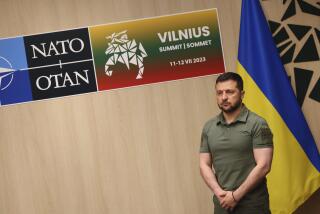Warsaw Pact Writes End to Brezhnev Doctrine
WARSAW â Foreign ministers of the Warsaw Pact ended a two-day meeting Friday with a declaration of sovereignty and non-interference in each otherâs affairs that effectively abolishes the Brezhnev Doctrine that led to continued Soviet domination in Eastern Europe.
A final communique issued at the meeting ensures the right of each nation to independently decide its own form of government, free from any outside interference or intimidation.
The seven Warsaw Pact ministers said such a right is essential to long term peace and stability throughout Europe.
The meeting, which began Thursday, is the first in the allianceâs 34-year history to be hosted by a non-Communist government. Poland installed the first non-Communist regime in the East Bloc in August, after a Solidarity-led coalition defeated the Communist Party in parliamentary elections.
âOne of the essential prerequisites for the building of a secure, peaceful and indivisible Europe is to respect the right of each nation to independently decide about its fate (and) freely choose the roads of its social, political and economic development, with no external interference,â the ministers said in a seven-page communique.
The statement ensuring the sovereignty of alliance members repudiates the pactâs longstanding policy as dictated by Moscow allowing for the Soviet Union to take action to preserve Communist regimes in its sphere of influence in Eastern Europe.
The policy named after the late Soviet leader Leonid I. Brezhnev led to Soviet and Warsaw Pact intervention in Czechoslovakia in 1968 that helped crush a budding pro-democracy movement there.
The communique referred to the need of building a âsecure and indivisible Europe.â
It also said that all nations of Europe, both East and West, should have human rights and fundamental freedoms guaranteed.
Soviet Foreign Minister Eduard A. Shevardnadze, in an interview published Friday, underscored the demise of the Brezhnev Doctrine by acknowledging his country is concerned about Poland being led by a non-Communist government but insisting that the Kremlin respects the will of the people.
Polish Deputy Foreign Minister Boleslaw Kulski told reporters that in accordance with the final communique the meeting also discussed the eventual withdrawal of Soviet troops stationed in East Germany, Czechoslovakia, Hungary and Poland.
More to Read
Sign up for Essential California
The most important California stories and recommendations in your inbox every morning.
You may occasionally receive promotional content from the Los Angeles Times.










